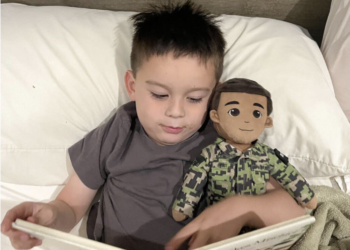School closures have left parents scrambling to adjust daily routines for education requirements that vary from district to district. Some states announced the possibility that students will return at some point before the end of the year, utilizing a version of online coursework to replace in-class instruction. Others, like California and Alabama, made the call to end the academic year now. What’s unknown is the short- and long-term impact to children’s learning and development.
Will military children fall through the cracks?
Military kids already face education challenges from frequent relocations — in some cases every two to three years — and a lack of standardization from school to school. With so many unknowns built into the military lifestyle, how can parents advocate for their children’s education?
Unbeknownst to many, all 50 states and the Department of Defense Education Activity (DoDEA) schools have signed what is known as the Military Interstate Children’s Compact Commission (MIC3). This compact provides rights to military-connected children and their families to protect them from being a school district afterthought.
“There is no military-connected student who would move from one school district or local education to another and would not be covered by the provisions of MIC3,” Judy Glennon, Parent Initiatives Program Manager from the Military Child Education Coalition (MCEC), said. “The interstate compact is there to make sure that military children are not disadvantaged to the extent possible when they move from one school district to another.”
Glennon emphasized these rights will not be removed just because the coronavirus has changed the way education is currently delivered in our country. MCEC’s primary purpose is to “help the military child thrive in the face of transition and separation.” It joins other nonprofit organizations in monitoring the rights of military children.
What is expected of parents?
In normal times the nature of military life already places high stressors on a household, which can include deployments, living far from family, careers, solo-parenting, Murphy’s Law and more in just one calendar year. Add in a worldwide pandemic and military families, who were may have already been drowning, are now asked to stay afloat when it feels like they’ve been thrown another 10-pound weight.
[Read about an Air Force family living in limbo in Bavaria, Germany]
“When you’ve got one or both parents at home with the kids and trying to deal with the schoolwork and their jobs and trying to put food on the table, it’s stressful,” Glennon said about how families should rank competing priorities. “It’s difficult and there is no good answer, sadly.”
These concerns were also addressed at a Blue Star Family-sponsored Virtual Town Hall in March. Dr. Jarrod Wheeler, superintendent of schools for the Knob Noster School District in Missouri, near Whiteman Air Force Base, addressed what is being asked of stressed families. Wheeler’s plan is to “move forward with our education, but we are not adding stress, not adding anxiety. We are here to serve our families and bring them a sense of calmness and normalcy.”
Educators must educate. Parents must work. No one wants to choose what gets dropped.
The gap
There are many factors contributing to an education gap in America — most notably is money. Financial resources can improve school facilities, facilitate the hiring of more qualified teachers, and allows for the latest technology. Higher socioeconomic status is also associated with higher levels of education. Educated parents are more likely to read to their children, who are then more likely to perform well in school.
Military children have to contend with educational setbacks with each PCS and the coronavirus stands to set back the nation. While this gap in education is not unsurmountable, it will be hard for students, educators and parents to overcome.
According to Glennon, “In a normal school year (by this point) the teachers are reviewing material, they are finishing things they maybe haven’t covered yet. They are going over that curriculum with students to make sure they are ready to pass that annual exam.”
Although all standardized testing has been canceled, not all schools are in a review period.
On social media some parents express concerns that teachers are preparing substitute lesson plans and giving them to parents to implement. Minimally, distance education offerings are inconsistent, widening the gap.
The risk for EFMP children
For students with special needs the problem is exacerbated. These children may not be able to easily transition to a distance format and lose the social education component.
“This is a large burden to add to EFMP families that were already stressed,” Michelle Norman, AFI 2019 Navy Spouse of the Year and co-founder of Partners in Promise — an organization dedicated to advocating for military children with special needs, said. She adds, “permanent regression in our children’s education is now inevitable because parents cannot replace special education teachers and therapists.”
EFMP families rely upon the legally mandated, customized curriculum included in their children’s Individual Education Plans (IEP).
“Those things (IEPs) are put in place understanding the kids are going to be in the schoolhouse for the most part where they can provide those services,” Glennon said.
Meredith Marlier, a Kansas City, Kansas special education teacher, is trying to focus on what can be offered.
“If the alternative is no education or an unsafe school environment then as special educators, we will do what any educator would do, we will adapt,” she said.
“5 Steps to Success” is a fallacy
While an easy solution is desirable in this chaotic time, it may not be reasonable.
“Every military parent believes, and rightfully so, that their child is unique,” Glennon said. “So, for us to put a cookie cutter solution out and say, ‘this is what we have to do, and this is the answer for military-connected children’ would be a disservice to all of them.”
MCEC and others at the federal, state and local levels are working hard to develop answers to questions that have not yet been asked regarding this unprecedented gap in education due to the COVID-19 pandemic.
In the meantime, companies and organizations are getting creative in offering virtual teaching resources for parents and students. For example, the Khan Academy has a daily schedule with remote learning tools for students ages 2-18. Local libraries are promoting free online options to rent books and supplemental education materials. And Digital Daycare is a new YouTube series for school-aged kids that hosts guests from various careers and shares activities for STEM, yoga and more.
Check out these military-specific resources as you navigate this new normal
MCEC – Fully curated COVID-19 resource page with the ability to provide one-on-one support for military students
State Military Compacts – State legal statutes covered under the compact
MIC3 Interactive Map – Lists relevant contact information by state
MIC3 FAQs – Help answer questions before elevating concerns
School Liaison Officers can help parents connect to local resources
Special Education Guidance – U.S. Dept of Education – Parents of special needs children can find answers that address many of their concerns
Military One Source – Official DOD source of COVID-19 resources and support
Tutor.com – Offers free online 24/7 tutoring for military students K-12 and college-level subjects
Tricare COVID-19 FAQs – Learn more about medical benefits related to the Coronavirus
Blue Star Families – Get connected by completing surveys and participating in Town Hall events to learn more about how the military community will be impacted by COVID-19
Read comments






































